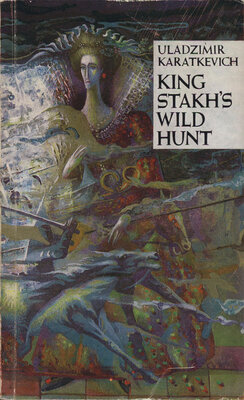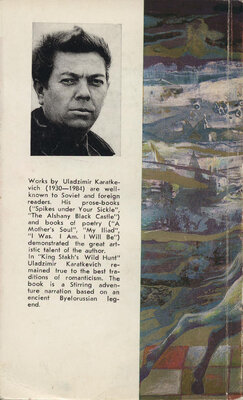King Stakh's Wild Hunt
Уладзімір Караткевіч
Выдавец: Мастацкая літаратура
Памер: 248с.
Мінск 1989
“To the 13th,” she said. “And better if they didn’t. These laws concerning one’s origin are pure foolishness, but you cannot fight them: these fireplaces, this necessity for one of the heirs to live in this house, the ban on selling it. Whereas we are beggars. And this house, this awful house... It is as if some curse has been put upon us. We were twice deprived of our family coat-of-arms, were persecuted. Almost none of our ancestors died a natural death. This one here in the red cloak was still alive when the church performed the funeral service over his body. This woman here with an unpleasant face, a distant relative of ours, Dostoyevskaya, (by the way, a distant ancestor of the writer), killed her husband and almost did the same with her step-son. She was condemned to death. It cannot be helped, all this must be paid for by descendants, and with me the Yanowsky family ends. But sometimes I ache so to lie in the warm sun, in the shade of real trees, trees that do not grow here. At times I dream of them — young, very large, airy as a green cloud. And spas, such bright, such full spas that take your breath away, that make your heart stop with happiness. But here this ugly, loathsome quagmire and gloom, these firs...”
The flames in the fireplace had brought a
slight flush to her face. Behind the windows the dark night had come into its own and it seemed a heavy shower had begun.
“Oh Mr. Belaretzky! I am so happy that you are here, that a person is silting beside me. Usually I sing aloud on such evenings, though I don’t really know any good songs, all arc old ones from the manuscripts gathered by my grandfather. And they are full of horrors: a man leaves a bloody track on the dewey grass, a bell that was long ago drowned in the quagmire rings at night, just rings and rings on and on...”
“The days come and the days go,” she began to sing, her voice deep and trembling.
The days come and the days go, A shadow looms over the land. Skazko and Kirdzy, the Rat, Raging, fight day and night.
Blood everywhere flows, Flames spread, steel rings. Falls our Skazko and calls: “Where are you, my friends?” Unheard are his cries.
But Lyuba Yuryevna hears.
Gathers her brethren.
Mighty and brave Far and wide They stormily rude To the distant red marshes.
“The rest is bad, I don’t wish to sing it. Only the last lines are good:
And they loved each other And in concord they lived While over the land Sunshine did reign Till into the earth Together were laid.
I was deeply touched, to the very depths of my soul. Such a feeling can arise in a person only when he deeply believes what he is singing
about. And what a wonderful song of olden times!
But she suddenly buried her face in her hands and began to sob. Upon-my word of honour, my heart bled. I couldn’t help it. I have an inexcusable and deep compassion for people.
I don’t remember the words I found to comfort her. I must say, dear reader, that up to this point in my story, I have been a severe realist. You must know that I do not very much like novels in the spirit of Madam Radcliffe, and would be the first to disbelieve, were anybody to tell me the things that took place later on. And therefore the tone of my story is going to change sharply.
Believe me, were this a product of my imagination, I’d have invented something entirely different. My taste is good, I hope, but not a single novelist who has self-respect would dare to offer serious people anything like it.
But I am relating the simple truth, I mustn’t lie. It touches me personally, is too important for me. Therefore I shall tell everything just as it happened.
We were sitting silent for some time; the fire was dying out and darkness had settled in the corners of the enormous room when I looked at her and was frightened: so wide were her eyes, so strangely bent her head. And her lips so pale, they were invisible.
“Don’t you hear anything?”
I listened. My hearing is very good, but only after a minute did I hear what she heard.
Somewhere in the corridor, to our left, the parquet was creaking under someone’s footsteps. -
Someone was walking through the long, endless passages, and the steps now quieted down,
now were heard again,—tap, tap, tap... went those stamping feet.
“Miss Nadzeya, what on earth’s the matter with you? What’s happened?”
“Let me be!... It’s that Little Man! He’s here again!... He is after my soul!”
From all this I understood only that somebody was amusing himself with stupid jokes, that somebody was frightening a woman. I paid no attention when she seized me by the sleeve in an attempt to hold me back. I grabbed the poker from the fireplace and rushed off down the steps into the corridor. This took only a moment and I opened the door with my foot.
The tremendous corridor was half in dark.ness, but I could very well see that no one was there. Nobody was there! Only the footsteps were there, they sounded as previously, somewhat uncertain, but quite loud. They were near me, but little by little they moved farther on to the other end of the corridor.
What could I do? Fight an invisible person? I knew that would come to naught, but I thrust the poker straight into the space where I heard the steps. The poker cut the emptiness and with a ring fell to the floor.
Funny? At that moment, as you may guess, I was far from laughing. In answer to my vainglorious knightly thrust something groaned, then two, three steps — and silence reigned.
Only now did I remember that my hostess was alone in that tremendous, poorly-lit room and hastened back to her.
I had expected to find her unconscious, gone mad with fright, to have died, anything except what I did see. Yanowskaya was standing at the fireplace, her face severe, gloomy, almost
calm, with that same incomprehensible expression in her eyes.
“In vain you rushed off there,” she said. “Of course, you saw nothing. I know, because only I see him and sometimes the housekeeper does, too. And Berman has seen him.”
“Who is ‘he’?”
“The Little Man of Marsh Firs.”
“But what is he, what does he want?”
“I don’t know. But he appears when somebody in Marsh Firs must die a sudden death. He may walk a whole year, but in the end he’ll get what he’s after.”
“It’s possible,” I joked unsucessfully, “he’ll walk another 70 years yet before your greatgrandchildren bury you.”
She threw back her head.
“I hate those who get married. And don’t dare to jest on this subject. Eight of my ancestors perished in this way,— they are only those about whom we possess notes, and the Little Man is always mentioned there.”
“Miss Yanowskaya, don’t worry, but our ancestors believed, by the way, in witches, too. And there have always been people ready to swear they had seen them.”
“And my father? My father? This was not notes, this I heard, this I saw myself. My father was an atheist, but he believed in the Little Man, even he believed until the very day when the Wild Hunt put an end to him. I hear him, you understand? Here you cannot convince me. These steps were heard in our castle almost every day before my father’s death.”
What could I do? Convince her that it had been auditory hallucinations? But I did not suffer from hallucinations, I had distinctly heard steps and groans. To say that it was some
cunning acoustic effect? I do not know whether that would have helped, although half the rumours about ghosts in old houses are based on just such tricks. For example, the famous ghost in the Luxemburg Palace in Dubrowna was finally discovered in the shape of a vessel filled with mercury and gold coins which some unknown joker had bricked up about 100 years earlier in the flue on the sunny side. No sooner did the night’s cold make way for the sun’s warmth, than a wild howling and rustling arose in all the rooms on the second floor.
However, is it possible to make a foolish little girl change her mind? Therefore 1 asked her with an air of importance:
“But who is he, what is he like, this Little Man of Marsh Firs?”
“I saw him three times and each time from afar. Once it was just before the death of my father. Twice — not long ago. But I’ve heard him, perhaps a hundred times. Nor was I ever frightened, except perhaps the last time... just a little, a very little. I went up to him, but he disappeared. It is really a very little man, he reaches up to my chest, skinny, and reminds one of a starved child. His eyes are sad, his hands are very long, and his head is unnaturally long. Fie is dressed as people dressed 200 years ago, only in the western manner. His clothes are green. He usually hides from me around the corner of the corridor and by the time I run up to him, he disappears, although the corridor ends in a blank wall. There is only one room there. But it is boarded up with long nails.”
I felt sorry for her. An unfortunate creature, she was very likely going mad.
“And that is not all,” she went on. “It’s perhaps 300 years since the Lady-in-Blue has been
seen in this castle — you see that one there in the portrait. The family tradition is that she has quenched her thirst for revenge, but I do not believe it. She was not that kind of a person. When they dragged her in 1501 to her execution, she shouted to her husband: ‘My bones shall find no peace until the last snake of your race has perished!’ And then for almost 100 years there was no escape from her: it was either a plague or a goblet of poison poured by some unknown person, or death caused by nightmares. She stopped taking revenge only on the great-grandchildren... But now I know that she is keeping her word. Not long ago Berman saw her on the balcony that is boarded up, and others saw her, too. I alone have not seen her, but that is her habit: in the beginning she appears before others, but to the person she is after, only at the hour of his death... My family will end with me. I know that. Not long to wait for it. They shall be satisfied.”
I took her hand and pressed it hard, desiring to bring the girl back to herself, somehow to divert her thoughts from the horrors she was speaking about as if in her sleep.
 КНІГІ ОНЛАЙН
КНІГІ ОНЛАЙН


